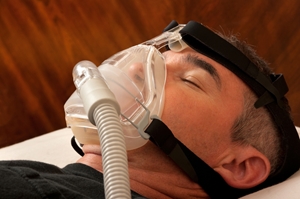
If you're one of the millions of people in the United States who suffer from asthma, chances are you may have at one point been prescribed inhaled corticosteroids to treat the symptoms of this chronic respiratory disease. However, according to a press release published on Friday, February 28, these medications may increase your risk of developing sleep apnea.
The source reports that researchers from the University of Wisconsin School of Medicine and Public Health studied a group of 18 asthma patients who were taking an inhaled corticosteroid called Flovent. They found that each patient showed signs of collapsibility in the upper airway and tongue changes — symptoms that are both consistent with sleep apnea.
The researchers noted that while they discovered this link between inhaled corticosteroids and sleep apnea, there's no proof of a cause-and-effect relationship. To learn more about this connection, they would have to conduct a much larger study.
In the meantime, experts say that folks who are taking inhaled corticosteroids to treat their asthma should continue to do so.
"If people with asthma are told they snore, they should talk to their physician about the possibility of sleep apnea," Dr. Mihaela Teodorescu, lead author of the study and an associate professor of medicine at the University of Wisconsin School of Medicine and Public Health, said in a press statement.
If you suffer from asthma, there are steps you can take around the house to keep your symptoms at a minimum. Consider purchasing hypoallergenic mattresses and an allergy mattress protector from the Allergy Be Gone website. These products will reduce your exposure to household irritants that can trigger asthma attacks.









